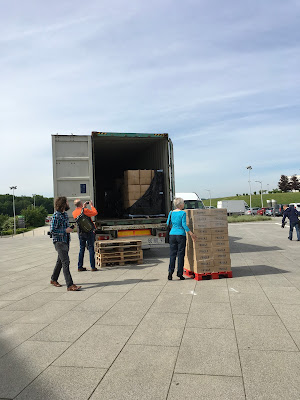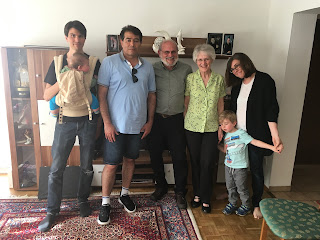From May 10-13 we had the privilege of attending the tenth international Mennonite assembly.
We've enjoyed traveling by train, but there was a rail strike in France so we had fun in our rental car.
Over 2000 Mennonites from France, Germany, Switzerland, Netherlands, Austria, Lithuania, Spain, and Portugal gathered in a sports complex in Montbeliard, France. Those of you who've attended world conferences can imagine the simultaneous translations over headphones and the getting to know people before worship and in workshops, over lunch or on a local tour.
We met very interesting, forthright, open and sincere persons.
We enjoyed the lively worship services with lots and lots of fantastic music from various choirs and bands. I might be able to add some short videos to a later blog. Right now I can't get the videos to work. There were some massively large choirs. The funniest were all the children when they sang, moved and gestured to the familiar pop tune by Ed Sheeran "The Shape of You", but with religious words!
The 14 years and older youth were expected to attend worship services (it was explained to me that sermons were kept short to hold their interest) and workshops. Then in the evening until late they had youth related activities. They all slept with their sleeping bags on this gym floor. The last snack was at midnight and they were awakened to loud music at 7 a.m. Ah, to be young!
Our meals were served on paper plates, but in courses, as is customary in France. We tasted meat from the famous
red & white Montbeliard cows, which were introduced by Joseph Graber, a Mennonite, in 1872.
And every single meal came with delicious Montbeliard cheese!
We were impressed with the flawless organization of the entire event.
Old quilts that had been donated by USA and Canada after WWII were displayed and their stories told, while over 900 new comforters made by Swiss, German, Dutch, and French Mennonites were collected here to be shipped to Syria.
Mari Friesen (Switzerland) set up the large area to both display old quilts, show the history of European Mennonites during and after WWII, and gave workshops on making comforters. One could come any time and work on numerous comforters set up on quilt frames. This type of blanket is an American tradition now being continued in Europe. We enjoyed talking with Lynn
Kaplanian-Buller, co-author of "Passing on the Comfort".
Just for my family: I have to admit it was a neat surprise to turn the corner and see this poster of my parents and then leaf through the many stories collected from archives. I'd forgotten the one when the people baking bread for the hundreds of Russian refugees in Berlin dumped in the flour bags from the States, only to discover little dark parts scattered throughout the dough. At first they tried to fish them out but it was useless, the mixing vat of dough at this professional bakery was too big. Daddy later figured out that the well-meaning Mennos had put tracts into the flour. It was one time that people really did eat the Word of God!
The cement stadium building was
beautified by hundreds and hundreds of colorful comforters.
Comforters for Syria.
Assembling hygiene kits
Some of the hygiene kit buckets ready to load
The comforters plus hundreds of filled MCC Relief hygiene buckets and school kits were packed into a container which will be shipped to Aleppo, Syria and distributed to refugees and displaced persons. Presbyterian pastor Ibrahim Nseir from that city spoke to us and he will be in charge of distribution. He spoke of the tolerance that used to exist there and told us of a statue from 5000 B.C that says, "If you disrespect a man's God, you disrespect him"!
This pastor's church started in 1848 and it was blown up on November 5, 2012 on the same day as the "Great Mosque of Aleppo". Muslims died defending the church and Christians died defending the mosque. He impressed upon us that his congregation got help from all over Aleppo to rebuild the church, including from the Grand Mufti of Aleppo, who has said that only with Christians will there be a solution because of the teaching "Love your neighbor..." He has a thriving school of now 1070 students, all Muslims but two Christians.
This has been a long blog. Did you make it all the way to the end? Bravo! Thanks for reading about our experiences. We're not getting much feedback, but we know there are a few of you readers out there. Thanks for caring.


















































